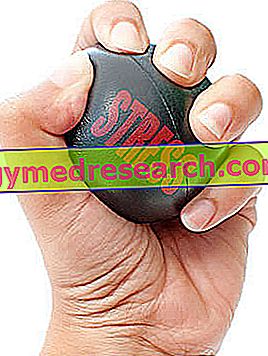
What is Dukoral?
Dukoral is a vaccine available as a suspension in a vial. It contains four different inactivated (killed) strains (types) of the bacterium Vibrio cholerae ( V.cholerae ) serotype O1 and part of a toxin derived from one of these strains as active ingredients. Dukoral is supplied with granules in a sachet to prepare the oral suspension.
What is Dukoral used for?
Dukoral is used to protect against cholera (a very serious disease caused by V. cholerae, which is contracted from contaminated foods or water and causes a severe form of diarrhea). Dukoral is used in adults, adolescents and children over the age of two who wish to travel to high-risk areas. Dukoral should be given according to official recommendations, taking into account the places where cholera is located and the risk of contracting the disease. Dukoral should not replace normal cholera protective measures including attention to dietary advice and hygiene rules.
The medicine can only be obtained with a prescription.
How is Dukoral used?
Dukoral is taken orally. In adults and children from six years of age, Dukoral is given in two doses, one to six weeks apart. Children between the ages of two and six must receive three doses, observing an interval of one to six weeks between each dose. The cycle must be completed at least one week before possible cholera exposure. For continued protection against cholera, a single booster dose is recommended, after two years for adults and children aged six and up and after six months for children between two and six years.
The vaccine is prepared by dissolving the granules in a glass of water to prepare an effervescent solution and adding the contents of the vial. Once prepared, the suspension should be drunk within two hours. Food, drink and other oral medicines should be avoided for one hour before and one hour after each dose of Dukoral.
How does Dukoral work?
Dukoral is a vaccine. Vaccines act by 'teaching' the immune system (the body's natural defenses) to protect itself against a disease. Dukoral contains small amounts of cholera bacteria killed and part of the cholera toxin called 'subunit B'. This subunit is not inherently toxic.
When a person receives the vaccine, the immune system recognizes the bacteria and the toxin and produces antibodies against them. In the future, the immune system will be able to produce antibodies more quickly if it is exposed to cholera bacteria. These antibodies help protect themselves from cholera by preventing bacteria and toxins from sticking to the walls of the intestine and from entering the body's cells.
In Dukoral, cholera toxin is produced by a method called "recombinant DNA technology": it is produced by a bacterium that has received a gene (DNA) that makes it capable of producing the toxin.
What studies have been carried out on Dukoral?
Since Dukoral has been used in Sweden since 1991, the company presented the results of three main studies that had already been conducted to support the use of Dukoral. The company also presented data from the scientific literature.
The three main studies included a total of nearly 113, 000 people. In all three studies, the efficacy of Dukoral, given in two or three doses, was compared to that of placebo (a fake vaccine). Studies were conducted in areas where cholera is found. The first study involved more than 89, 000 people in Bangladesh and compared the effects of Dukoral with the effects of the vaccine without the toxin and with those of placebo. In this study Dukoral was produced using a cholera toxin extracted from cholera bacteria instead of the most recent recombinant toxin. The other two studies compared Dukoral (containing recombinant cholera toxin) with placebo in over 22, 000 people in Peru. The people in the last study also received a booster dose 10 - 12 months later. In all three studies, the main measure of effectiveness was the 'protective efficacy' of the vaccine, calculated by comparing the number of people participating in the studies that developed cholera after receiving Dukoral and after receiving the placebo.
Another study was conducted to show that Dukoral was able to produce antibodies in people who do not come from areas where cholera is found. The company also presented information on the use of Dukoral for the prevention of a serious type of traveler's diarrhea caused by a bacterium called 'enterotoxigenic Escherichia coli '
What benefit has Dukoral shown during the studies?
In the Bangladesh study, the protective efficacy of Dukoral was 85% in the first six months of follow-up. The duration of vaccine protection was different for adults and children, six months in children and two years in adults. In adults, two doses of the vaccine showed the same efficacy as three doses. In the first of two studies in Peru, the protective efficacy of Dukoral was 85% for the first five months of follow-up. The other study in Peru showed that, after a booster dose, the protective efficacy of Dukoral during the second year of follow-up was 61%.
The information presented was not sufficient to support the use of Dukoral for traveller's diarrhea.
What is the risk associated with Dukoral?
The side effects of Dukoral are rare. However, the following undesirable effects observed in 1-10 patients in 1 000 were detected: headache, diarrhea, abdominal pain (belly), cramps, gurgling (gas) or malaise. For the full list of all side effects reported with Dukoral, see the Package Leaflet.
Dukoral should not be used in people who may be hypersensitive (allergic) to any of the active substances, to any of the other substances or to formaldehyde. Its use must be postponed in patients suffering from short-lived diseases of the stomach or intestine and in patients with fever.
Why has Dukoral been approved?
The Committee for Medicinal Products for Human Use (CHMP) has taken into account the fact that the risk of cholera for ordinary tourists is low but that Dukoral could be important for some groups, such as eg. health professionals in cholera epidemics. The committee decided that the benefits of Dukoral outweigh its risks for active immunization against the disease caused by the serogroup O1 of V. cholerae . The committee recommended that Dukoral be given marketing authorization.
More information on Dukoral:
On 28 April 2004, the European Commission granted a marketing authorization valid for Dukoral, valid throughout the European Union, to SBL Vaccin AB. The marketing authorization was renewed on 28 April 2009.
The full EPAR for Dukoral can be found here.
Last update of this summary: 04-2009.



